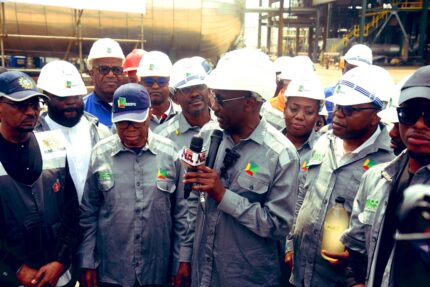Resumption of Operations in Warri Refinery Marks Milestone in Refinery Revitalization
Nigeria announced on Monday that operations have resumed at the Warri Refinery, marking a significant step in addressing the country’s longstanding reliance on fuel imports despite being Africa’s largest crude oil producer. The refinery, located in the oil-rich Niger Delta, had been inactive for nearly a decade due to years of neglect, disrepair, and crude oil shortages.
Mele Kyari, the Group Chief Executive Officer of the Nigerian National Petroleum Corporation (NNPC), led a tour of the facility alongside government officials and journalists, emphasizing the partial restoration of operations in Warri Refinery. “This plant is running. We have not completed 100%,” Kyari stated during the visit. According to a statement by presidential spokesperson Bayo Onanuga, the 125,000-barrel-per-day (bpd) refinery is currently operating at 60% capacity.
Warri Refinery:Facility Tour Highlights Progress
NNPCL’s Group Chief Executive Officer, Mele Kyari, led a tour of the facility on Monday, accompanied by Farouk Ahmed, CEO of the Nigerian Midstream and Downstream Petroleum Regulatory Authority. Addressing the team, Kyari emphasized that the inspection was to showcase the progress achieved at the facility. While acknowledging that the repairs are not fully complete, he confirmed the Warri Refinery is operational.
“This plant is running. We have not completed 100 percent, but we are steaming the other part of the plant as we progress. Currently, this plant is running,” Kyari stated. He dismissed skepticism surrounding the project, affirming, “Everything you see is real. This is pride for our country.”
The facility, located in Ekpan, Uwvie, and Ubeji in Warri, is a significant asset to Nigeria’s southern and southwestern regions. With an annual production capacity of 13,000 metric tonnes of polypropylene and 18,000 metric tonnes of carbon black, the WRPC holds the potential to reduce Nigeria’s reliance on imported petrochemical products.
Historical Context of Nigeria’s Refinery Challenges
The Warri Refinery’s closure in 2015 was part of a broader crisis involving Nigeria’s four state-owned refineries, which have suffered from decades of neglect, poor management, and financial misappropriation. These facilities, including the 110,000 bpd Kaduna refinery and the 60,000 bpd Port Harcourt refinery, were intended to collectively process 445,000 bpd of crude oil but have struggled to meet their objectives.
This chronic underperformance forced Nigeria to import the majority of its refined petroleum products, draining foreign reserves and heightening economic vulnerabilities. The revival of the Warri Refinery follows the recent operational restart of the Port Harcourt refinery, with NNPC committing to revamping all four state-owned facilities within 2024.
Strategic Shift Towards Self-Sufficiency in Fuel Production
The Nigerian government has prioritized refinery revitalization as a cornerstone of its strategy to achieve self-sufficiency in fuel production. The partial restart of Warri Refinery is a critical component of this effort, signaling progress in President Bola Tinubu’s broader economic reforms. While the Warri refinery is not yet fully operational, its current capacity of 75,000 bpd represents a substantial improvement over years of dormancy.
NNPC’s efforts are complemented by private sector initiatives, notably the commissioning of the 650,000 bpd Dangote Refinery in Lagos earlier this year. Built by Nigerian billionaire Aliko Dangote, the refinery is the largest in Africa and is expected to drastically reduce the country’s dependency on fuel imports once it reaches full operational capacity.
The Path to Privatization
The federal government has signaled a bold shift in energy policy with plans to fully privatize Nigeria’s state-owned refineries, including those in Warri, Port Harcourt, and Kaduna. Special Adviser to the President, Sunday Dare, announced the development in November, reiterating the administration’s commitment to refinery reform and efficiency.
The privatization plan seeks to address decades of inefficiency in state-owned refineries, which have largely remained non-functional despite heavy investments. By transferring management and ownership to private entities, the government aims to unlock the full potential of these facilities, attract foreign investment, and restore confidence in Nigeria’s refining sector.
Implications for Nigeria’s Oil Sector and Economy
The resumption of operations at the Warri Refinery is expected to have wide-ranging implications for Nigeria’s oil sector and economy. It signals a shift away from costly fuel imports and positions the country to better capitalize on its status as a leading crude oil exporter. Analysts also see it as a potential boost for job creation and economic growth in the Niger Delta, a region often plagued by poverty and unrest despite its resource wealth.
However, challenges remain, including achieving full operational capacity and maintaining the momentum of the current reforms. Industry observers caution that without addressing systemic inefficiencies and ensuring transparency in refinery management, the gains from these efforts could be short-lived. Still, the progress at Warri provides a glimmer of hope for Nigeria’s refining sector after years of stagnation
Table of Contents
Discover more from OGM News NG
Subscribe to get the latest posts sent to your email.














